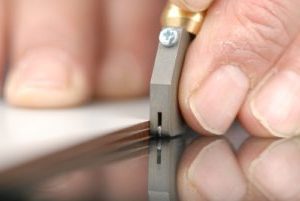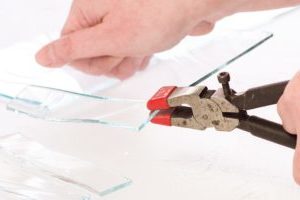Glass cutting is a skill used done by individuals who are working in the glass manufacturing industry. There are those who also use glass cutting tools for crafts and recreational purposes.
Glass art is increasingly becoming popular and is a great way to utilize all those creative juices during free time.
There is a misconception that working with glass is rather difficult to learn. The truth is that glass is relatively easy to deal with despite its fragile characteristic.
Cutting glass and turning the finished products into pieces of art or using them for a home improvement project can be easily achieved by using the right glass cutting tools.
If you are interested to get into glass cutting there are several tools that you need to purchase and be familiar with:
Glass Cutter
A glass cutter is yet the most important tool in your arsenal. There are hand-held glass cutters and there are also those that are guided by electronic systems such as laser cutting machines.
Laser cutting machines are mainly used in big-scale industries and glass cutting manufacturing plants.
A typical glass cutter is 5 to 6 inches long and is made from hard materials such as plastic or stainless steel. Regardless of body construction, a glass cutter features a cutting wheel on one end.
- The V-shaped cutting wheel is made of steel or tungsten carbide.
Tungsten carbide is known as one of the hardest substances on earth, thus it is an ideal tool to cut through annealed glass.
- Glass crafters have the option of using either a regular glass cutter or a self-oiling glass cutting tool.
The latter has a reservoir along its body that holds the lubricating oil. The container then dispenses lubricating oil while the cutting wheel is scoring through the glass.
- The other end of a glass cutter usually has a ball made of stainless steel.
Glass cutters use the ball end portion of a glass cutter to tap the glass after scoring. This makes it easier for the glass to break away from its original piece.
- Another variation of a glass cutter is a pistol grip glass cutter.
The only difference between a pistol-grip glass cutter and a regular glass cutter is that the former has an ergonomic handle attached to the body of a glass cutting mechanism.
According to glaziers who prefer using a piston-grip glass cutter, they are easier to handle and use. The user does not need to exert too much energy when scoring through the glass. In addition, these tools are more expensive as well.
Glass Pliers
You cannot use just any type of glass when breaking scored glass. Breaking the glass is made easier when you make use of glass pliers.
The two main types of glass pliers are:
- Breaking pliers
- Grozing Pliers
Aside from their primary purposes, these tools can also be used for other purposes as well.
However their primary purposes are to clean cut glass and chip off small pieces of glass after breaking. The aforementioned pliers are used to clamp glass as well.
Breaking pliers are mainly used to break the glass into several pieces. When cutting small pieces of glass, breaking pliers truly come in handy. They can expertly break a small chip of glass to produce a cleaner break.
Grozing pliers on the other hand are used to chip away glass small bits and pieces of glass. This is an excellent alternative tool when you don’t have a glass grinder.
Cutter Oil
A cutter oil may not seem relevant in the glass cutting process, but it does have a lot of purposes and benefits in the process:
- Provides sufficient lubrication to the glass cutting wheel
- Maintains the cutter blade in its ideal performance and condition
- Prevents the blade from being destroyed whole scratching against the glass surface
- An even and smoother scoring is achieved when glass cutting oil is applied or rolled on to the surface
- Gets rid of shards of glass that may get stuck in the cutting wheel
- Ensures a safe working environment as it prevents shards of glass from flying around and causing accidents
























Leave a Reply
View Comments